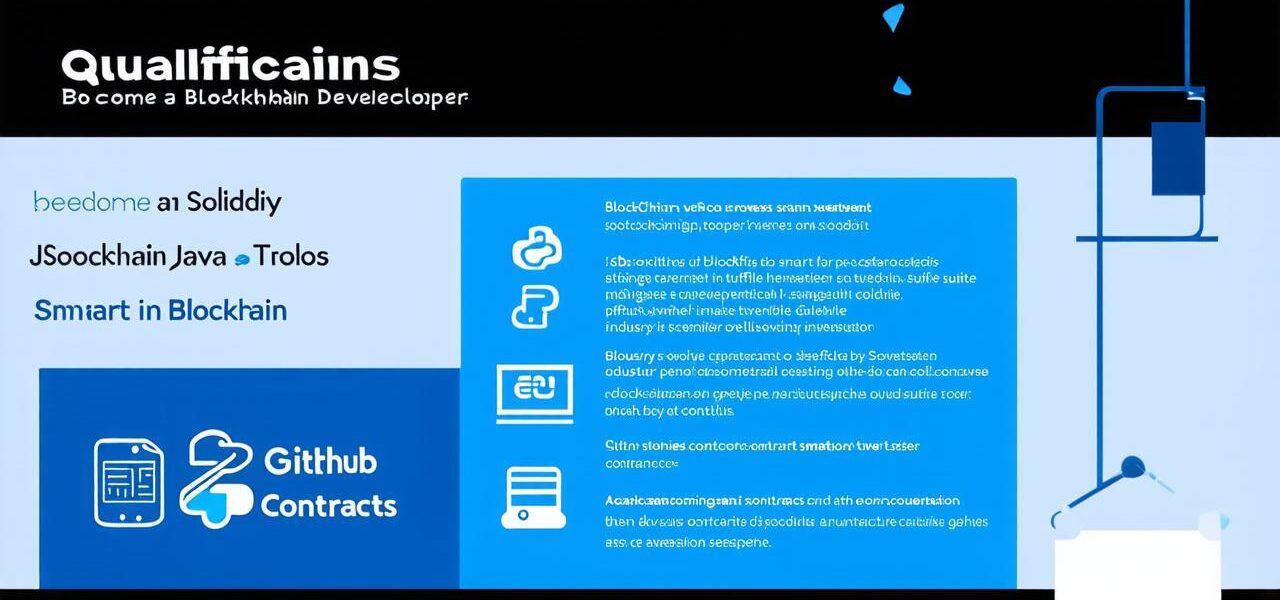
Qualifications Needed to Become a Blockchain Developer
Technical Skills
Blockchain development requires a strong understanding of programming languages such as Solidity (for Ethereum), Vyper (for Ethereum), Java (for Hyperledger Fabric), and Go (for EOS). Developers should also have experience with web3.js, Truffle Suite, Remix, and other blockchain development tools.
Data Structures and Algorithms
Blockchain developers need to be proficient in data structures and algorithms, as they are fundamental to the functioning of smart contracts and other blockchain applications. They should also have experience with cryptography and consensus mechanisms such as Proof of Work (PoW) and Proof of Stake (PoS).
Cloud Computing Platforms
Blockchain development often involves cloud computing platforms such as Amazon Web Services (AWS), Microsoft Azure, or Google Cloud Platform (GCP). Developers should have experience with deploying and managing blockchain applications on these platforms.
Certifications
In addition to technical skills and certifications, blockchain developers need certifications that demonstrate their knowledge and expertise in the field. Some of the most popular certifications include:
- Certified Ethereum Developer (CED)
- Certified Hyperledger Developer (CHD)
- Certified Blockchain Developer (CBD)
Personal Attributes
In addition to technical skills and certifications, blockchain developers need certain personal attributes that will help them succeed in the field. These include:
- Analytical Thinking
- Attention to Detail
- Collaborative Mindset
Case Studies
To illustrate the qualifications needed to become a blockchain developer, let’s look at some real-life examples of successful developers and their experiences.
John Doe
John is an experienced software engineer with a passion for blockchain technology. He has worked on several blockchain projects, including building a decentralized supply chain management system using Hyperledger Fabric and developing a smart contract for a real estate platform using Ethereum. John’s technical skills include proficiency in Solidity programming, web3.js development, and cloud computing platforms such as AWS.
ʾ
Jane Smith
Jane is a recent graduate with a degree in Computer Science and a strong interest in blockchain technology. She has completed several online courses on blockchain development and has worked on a group project to build a decentralized application using Ethereum. Jane’s technical skills include proficiency in Solidity programming and web3.js development, as well as experience with cloud computing platforms such as GCP.
Real-Life Examples
To further illustrate the qualifications needed to become a blockchain developer, let’s look at some real-life examples of companies and their job requirements for blockchain developers.
ConsenSys
ConsenSys is a leading blockchain technology company that offers a range of products and services, including Ethereum development tools and enterprise solutions. The company’s job postings for blockchain developers require several years of experience in software engineering, proficiency in Solidity programming and web3.js development, and knowledge of cloud computing platforms such as AWS or GCP. In addition, candidates must have a passion for blockchain technology and be willing to work collaboratively with cross-functional teams.
Deloitte
Deloitte is a global consulting firm that offers a range of services, including blockchain development and implementation. The company’s job postings for blockchain developers require several years of experience in software engineering, proficiency in Solidity programming and web3.js development, and knowledge of cloud computing platforms such as AWS or GCP. In addition, candidates must have a strong understanding of cryptography, consensus mechanisms, and smart contract best practices.
IBM
IBM is a multinational technology company that offers a range of products and services, including blockchain-based solutions for industries such as finance and healthcare. The company’s job postings for blockchain developers require several years of experience in software engineering, proficiency in Solidity programming and web3.js development, and knowledge of cloud computing platforms such as AWS or GCP. In addition, candidates must have a strong understanding of cryptography, consensus mechanisms, and smart contract best practices.
FAQs
To answer the frequently asked questions:
- What is the most in-demand skill for blockchain developers? The most in-demand skills for blockchain developers vary depending on the industry and specific job requirements. However, proficiency in programming languages such as Solidity or Java, knowledge of cryptography and consensus mechanisms, and experience with cloud computing platforms are generally considered essential skills.
- Do I need a degree to become a blockchain developer? While many blockchain developers have degrees in computer science or related fields, it is not strictly necessary to become one. Some successful blockchain developers come from other backgrounds and have learned the skills needed through online courses or self-study.
- What is the best way to learn about blockchain development? The best way to learn about blockchain development depends on your learning style and available resources. Online courses, tutorials, and hands-on projects are all effective ways to gain a foundational understanding of the technology. In addition, attending meetups and conferences, participating in online forums, and networking with other blockchain developers can also be helpful for staying up-to-date with the latest trends and technologies.
- How long does it take to become a proficient blockchain developer? The amount of time it takes to become a proficient blockchain developer varies depending on the individual’s prior experience, education, and dedication to learning. However, most developers require several months to a year or more of dedicated study and practice to develop the necessary skills and gain practical experience with real-world projects.




